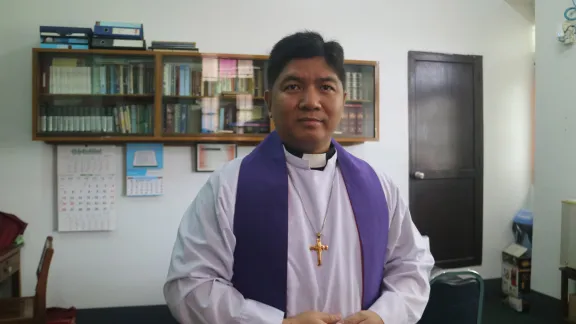
General secretary of the Federation of Lutheran Churches in Myanmar, Rev Martin Lalthangliana. Photo: FLCM
Voices from the Communion: Rev. Martin Lalthangliana
(LWI) - Working together to transform the lives of people adversely affected by political and economic strife, and recently a health pandemic, the Federation of Lutheran Churches in Myanmar (FLCM) general secretary, Rev. Martin Lalthangliana says the four-church federation always places diakonia and peaceful solutions among the churches’ top objectives.
Why did FLCM choose to engage in humanitarian work?
One of the objectives mentioned in FLCM’s constitution is “to further […] diaconal action, alleviation of human need, promotion of peace and human rights, social and economic justice, care for God’s creation and sharing resources,” among member churches. The very DNA of FLCM has a desire and commitment to engaging in humanitarian work.
What is particular about the context in Myanmar?
Myanmar is a developing nation with vast new opportunities in business, trading and social reform. In response to the ethnic conflicts, the peace-building process is playing an important role in transforming the nation. With the new democratic government, the country’s social, political and economic health will gradually change in the next few years, with the help of international communities.
Which emergencies have you been responding to lately?
In partnership with Lutheran World Federation Department for Theology, Mission and Justice and the Finnish Evangelical Lutheran Mission (FELM), FLCM responded to COVID-19 emergencies in Myanmar.
The impact was mostly in Yangon City, the largest region in Myanmar, but the virus also affected Chin State in western Myanmar and neighboring Sagaing Region. To contain the virus, the government locked down the country which has caused food insecurities due to business closures and lack of employment. Social distancing and restrictions on large group gatherings are a challenge for church ministries, its leaders and its members who are suffering financially. FLCM implemented emergency aid to assist 1000 at-risk families in Myanmar who were in critical need of food and sanitization essentials to prevent the virus.
Most of our members are farmers, street vendors, carpenters, and builders so when the economy is slow, it directly affects their livelihoods, their family, and indirectly, has adversely impacted moral, ethical and social problems among the community.
What are the churches’ specific strengths?
Working together is one of the specific strengths we have among the federation’s four member churches. Each of the churches has its own mission and development programs in various parts of the country. These ministries give the federation an opportunity to learn holistic mission from each other, deepen our theological thoughts, and provides opportunities to discuss and develop new ideas to strengthen our capacity for ongoing mission work in each of the areas. FLCM belongs to the Lutheran family, so we hope to increase diakonia in Myanmar with our partners in the global Lutheran body.
What are challenges when a church engages in humanitarian work?
There are many challenges. Lack of finances and human resources, insufficient technical equipment, and limited knowledge of the infrastructure makes engaging in humanitarian work in a new field difficult.
How does the church respond when religion is used to incite violence?
For our churches, we try to avoid conflicts by peacefully participating in social, political and economic transformation. Violence is not the Christian solution to change but rather raising our voices and defending those in the marginalized society. This is always the objective of our church.
Does faith help the church deal with difficult situations?
The definition of a Christian in Myanmar in the eyes of non-Christians means one who has good manners, good ethics, and are good singers and musicians! This image sometimes helps in a social context to overcome some problems. In Myanmar, a lot of well-educated Buddhists perceive Christians as people who want to transform the lives of the underprivileged.
What gives you hope?
In Myanmar, the poverty level is so high that many people are still under the influence of those who hold more power than they do. The education and relief work our church, LCM is doing in some of the regions of Myanmar, are helping many families rebuild their lives and open doors.
An example is a new couple from our church who recently married, became jobless and underpaid as a result of COVID-19 economic ramifications. The church helped them sustain their family while looking for adequate employment. The couple is grateful for the church and the program.
The Lutheran World Federation is a global body that shares the work and love of Christ in the world. In this series, we profile church leaders and staff as they discuss topical issues and set out ideas for building peace and justice in the world, ensuring the churches and communion grow in witness and strength.


